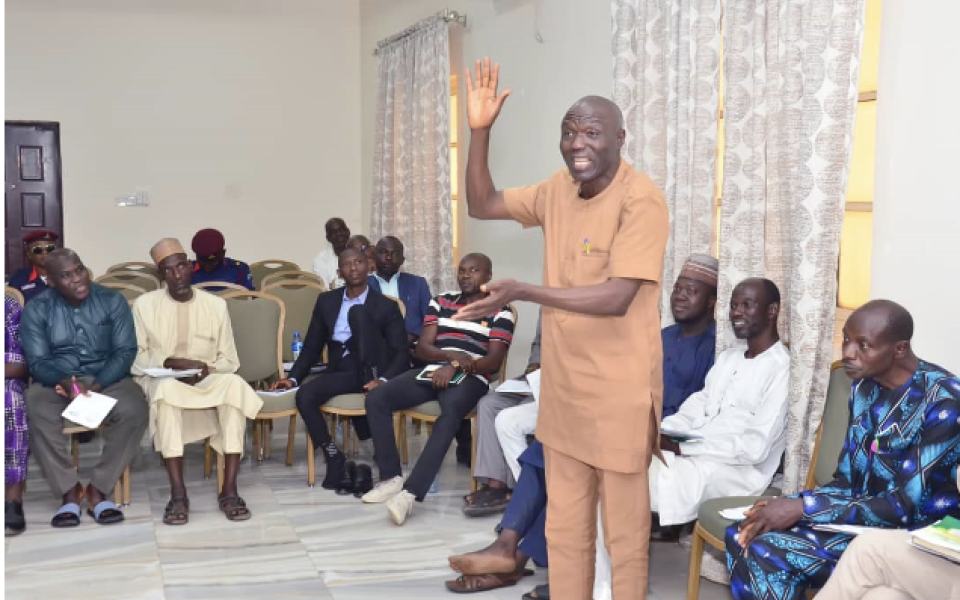
“Her approach didn’t just stop the fight; it created a space where both young men could reflect on the deeper causes of their anger. This intervention showed me how powerful it can be when community members are equipped to manage conflict—sometimes, all it takes is one person stepping forward with calm and reason to break the cycle of violence.” Samson Nicodemus Beska, Executive Director, Mulapnen Capacity Building Initiative CC, Nigeria
Local citizens and religious leaders take the lead in preventing violence throughout Nigeria. Given a well-tested approach, locally adapted methods, ongoing training and community support, members in several URI Cooperation Circles and partnering groups are interrupting entrenched patterns of violence.
Karen Volker, URI Director of Partnerships and Violence Prevention, is passionate about changing the way people across the world understand and deal with violence. In November 2023 Karen traveled to Jos Nigeria. Together with Dr. Emmanuel Ivorgba, the URI West Africa Regional Coordinator, they introduced a plan to implement a leading-edge Health Approach to Violence Prevention to a widening circle of communities. Likening ongoing violence to the spread of infectious diseases, the Health Approach is based on three keys:
- Detect and interrupt the spread.
- Change the behaviors of people at the highest risk.
- Change the way violence is viewed in the community.
A recipient of the training, Mr. Samson Nicodemus Beska, shared a local story about a woman who interrupted a potentially violent confrontation. Two men got into a heated argument that looked like it was going to get physically violent. One of the men’s mothers, also trained in conflict resolution, stepped in. She calmly approached. Instead of yelling or reprimanding the men, she asked them to share what they were feeling. Through her gentle and firm intervention, she helped both young men realize that the issue was rooted in miscommunication and misunderstandings, not a matter that needed violence.
Mr. Beska said he will carry an early intervention mindset regarding violence prevention throughout his life.
“Violence doesn’t always begin with dramatic events, it starts with small signs – misunderstanding, isolation or unaddressed anger. Intervening early by offering support, listening, or mediating disagreements, can prevent conflicts from escalating into violence.”
Additionally, Mr. Beska reflected on the deep interconnection between personal trauma and violent behavior. “This understanding shifted my perspective, showing me that violence prevention is not just about stopping an incident; it’s about addressing the root causes, which are often linked to emotional pain, inequality, or unresolved issues. I was surprised to learn that people can change, and many simply need the right support, tools, and safe spaces for dialogue to break old patterns.
People who have been violent can become peacemakers when they are shown empathy and given the opportunity to heal.”
Ongoing challenges persist:
- The lack of trust in institutions. In communities that have experienced systemic violence or oppression, there’s often a deep mistrust of authority figures like the police or government programs.
- Need to address the underlying causes of violence, which often stem from poverty, lack of opportunity, and historical injustices.
- Need for community-based training and resources. Many people lack the tools and knowledge to manage conflicts peacefully and de-escalate situations before they become violent.
- Access to mental health support as many individuals who experience or perpetrate violence are dealing with untreated mental health challenges.
URI’s Violence Prevention initiative helps people within their communities develop practical violence prevention skills. Mr. Beska shares his experience,
“When people in a community know each other and are actively involved in supporting one another, it becomes more difficult for violence to thrive. Community-driven violence prevention initiatives help create safe spaces for open dialogue, where people can express their frustrations and work together to find nonviolent solutions. This sense of solidarity and shared purpose strengthens the fabric of the community, creating an environment where peaceful conflict resolution becomes the norm. Acting together, each community sends a message that violence is not tolerated and that peace is a shared responsibility.”
To learn more about URI’s Violence Prevention approach: https://www.uri.org/health-approach-violence